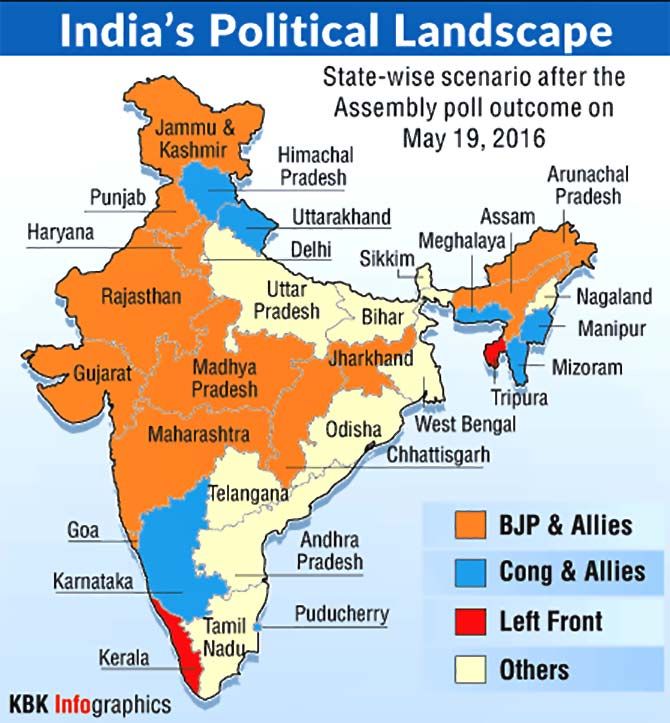 | « Back to article | Print this article |
What the Congress will have to understand is that it is not enough to have a 40-something vice-president in New Delhi, but young faces with fresh ideas in the states,' says Amulya Ganguli.
 Anti-incumbency and weak opponents have helped the winners in the latest round of elections.
Anti-incumbency and weak opponents have helped the winners in the latest round of elections.
The most obvious example is Assam where the Hindu middle class has finally been able to put their favourite party in power.
The BJP has been eying Assam ever since the All Assam Students Union started its anti-foreigner agitation in the 1980s, ostensibly targeting Bangladeshi infiltrators but also fomenting communal passions against both Assamese and Bengali Muslims.
The movement was tailor-made for the BJP's anti-Muslim outlook which made it raise the spectre of the Hindus being reduced to a minority in Assam -- a fear which the Sangh parivar used to voice about India as a while during the Ram Janmabhoomi agitation.
However, the Assam Accord signed by Rajiv Gandhi in 1985 and AASU's degeneration after coming to power put paid to the BJP's hopes of ruling Assam.
After more than quarter of a century, the hope is being fulfilled for the BJP with AASU's successor, the Asom Gana Parishad, as a partner.
What helped this broad saffron combination is not so much popular apprehensions of a Muslim takeover as the anti-incumbency factor undermining the Tarun Gogoi government after its 15 years in power.
Gogoi might have been able to stave off the BJP if he was able to accommodate the ambitious Himanta Biswa Sarma, who wanted to succeed the octogenarian chief minister.
However, a decade-and-a-half in office foster a sense of invincibility which made Gogoi ignore the threat from the young man.
The Congress' feudal leadership in New Delhi then compounded Gogoi's mistake by not taking Sarma seriously.
Rahul Gandhi reportedly did not care to take a decision on meeting him till after Sarma's resignation. Assam, after all, was too far away and Sarma had been only a minister before his break-up with Gogoi.
It is possible that Sarma's presence in the BJP along with that of the Union minister for sports and youth affairs, Sarbananda Sonowal (formerly of AASU), gave the BJP a momentum which Gogoi could not counter, especially after Sonowal was projected as the chief ministerial candidate.
The two young men provided an alternative which the 85-year-old Gogoi could not match.
Interestingly, the septuagenarian Sheila Dixit, too, could not withstand the political onslaught of the youthful Arvind Kejriwal despite her 15 years as a fairly successful chief minister in Delhi.
What the Congress will have to understand is that it is not enough to have a 40-something vice-president in New Delhi, but young faces with fresh ideas in the states.
The party did not have any one young in Assam, nor in Kerala although, ironically, it was ousted by a 93-year-old Marxist in the southern state.
But it wasn't anti-incumbency which swept Oommen Chandy out of power so much as the stain of the solar panel scam and the controversy over bar licences for which K M Mani had to resign as finance minister.
In contrast to these tainted warriors, the CPI-M's V S Achuthanandan is known for his rigid ideology a la another Malayalee, Prakash Karat.
But how effective Achuthanandan's Soviet-style economy will be in Kerala in the 21st century will be keenly watched at home and abroad.
If undiluted Marxism is to be the order of the day in Kerala, true-saffron Hindutva will have its new laboratory in Assam as the philosophy once did in Gujarat, leading to the 2002 riots.
Assam may not meet the same fate because the BJP has become much more cautious after that outbreak. But the communal scene is unlikely to be an ideal one.
Unlike Gogoi and Oommen Chandy, Mamata Banerjee and Jayalalitha were able to beat anti-incumbency because they faced weak opponents.
In West Bengal, the Left is yet to live down its stifling Stalinist reign of three decades even if many of the cadres who are now at Didi's beck and call are said to be retired Marxists.
Mamata is still being given a chance by hoi polloi because the commissars deserve to be punished for a longer period than five years while their new ally, the Congress, has lost all its leaders like Saugata Roy and Subrata Mukherjee to Didi even as Priya Ranjan Das Munshi remains in a comatose stage in hospital.
Like Didi, Amma, too, faced weak opponents. Although the DMK was expected by some analysts to pip the AIADMK at the post because of Jayalalitha's non-performance during last winter's devastating rains in Chennai, the chances of the 92-year-old M Karunanidhi beating the odd against the formidable czarina of Poes Garden were not too high.
The fact, however, that the tainted DMK did put up a fight shows that Jayalalitha's image did become soggy because of the rains.
Amulya Ganguli is a writer on current affairs.